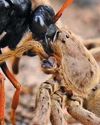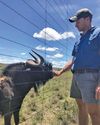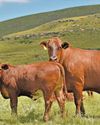कोशिश गोल्ड - मुक्त
Women are 'saviours' or 'victims' in the climate change debate: why this is a problem
Farmer's Weekly
|February 14, 2025
By avoiding the portrayal of women as either 'victims' or 'saviours' in climate and development literature, we can ensure that building sustainable economies does not reproduce gender injustices, write Prof Naila Kabeer, researcher Chung-Ah Baek, and Prof Deepta Chopra.

"Certain stereotypes about women have become commonplace in climate and development literature. One example is that women are either represented as 'saviours' who protect nature, or as 'victims' more vulnerable to climate impacts than men and less equipped to cope.
Simple either/or ways of seeing women overlook the power dynamics and structural factors that give rise to the stereotypes.
Based on our decades of research into gender issues and the environment, we use evidence from the global south to unpack underlying assumptions. We call for a more complex framing of gender, care and climate change.
This will help ensure that building sustainable economies doesn't reproduce gender injustices.
WOMEN AS SAVIOURS
The idea of women as 'saviours' generally revolves around their role in unpaid care work and their stake in preserving natural resources. Women and girls bear more than their share of responsibility for unpaid work essential to daily survival and intergenerational care in their communities.
This inequality, rooted in long-standing patriarchal norms, in turn generates inequalities in opportunities to make a living.
It is necessary to assess how these inequalities play out among different social groups. For example, women from more affluent classes generally outsource their unpaid care duties to paid workers, usually women, from poorer, often socially marginalised, households. That allows the more affluent to get better paid and formal employment. They feature far less in the 'women as saviour' literature on climate change.
By contrast, women from marginalised and lowincome households have no choice but to rely on their own unpaid labour to care for their families.
They also do labour-intensive tasks like fetching fuel and water and maintaining buildings without modern conveniences. They take care of family well-being without accessible public services.
यह कहानी Farmer's Weekly के February 14, 2025 संस्करण से ली गई है।
हजारों चुनिंदा प्रीमियम कहानियों और 10,000 से अधिक पत्रिकाओं और समाचार पत्रों तक पहुंचने के लिए मैगज़्टर गोल्ड की सदस्यता लें।
क्या आप पहले से ही ग्राहक हैं? साइन इन करें
Farmer's Weekly से और कहानियाँ

Farmer's Weekly
Pastry delights and cupcakes
The versatility of pastry in baking and cooking is best flaunted by two vastly different recipes appealing to the sweet and savoury tooth, while a novel way to bake those Christmas-themed cupcakes will also go down well.
4 mins
December 5-12, 2025

Farmer's Weekly
Specialised spider-hunting wasps
Wasps are apex predators of the insect world and have developed many survival strategies. One group of wasps focuses on hunting spiders to provide a source of food for their larval offspring
2 mins
December 5-12, 2025

Farmer's Weekly
From bulls to boardrooms: farming part-time as a professional
Maintaining a farm requires time, resources, and commitment. Farming part-time while being fully employed elsewhere can seem daunting and risky. Although it certainly presents unique challenges, it is feasible for some. Koot Klopper and Herman van Heerden spoke to Henning Naudé about how excellent time management and the delegation of resources, as part-time farmers, successfully keep their farms productive.
5 mins
December 5-12, 2025

Farmer's Weekly
Holy Shiitake: mastering the science of gourmet fungi
Mushroom production is inherently the practice of expanding mycelium. But since wanted and unwanted fungi flourish under the same circumstances, a mushroom farmer's biggest challenge is ensuring the right fungi prevails. Lindi Botha reports on Rory Brooks' learning curve.
9 mins
December 5-12, 2025
Farmer's Weekly
No more 'secret' price hikes?
'Secret' electricity price hikes in South Africa have been curbed in a game-changing court ruling, explains Felix Dube, lecturer in the Department of Law at the University of Venda.
4 mins
December 5-12, 2025

Farmer's Weekly
The cutworm scourge, and how to control it
The dominant cutworm, Agrotis segetum, is causing renewed, costly damage to South African maize, soya bean, and sunflower.
5 mins
December 5-12, 2025
Farmer's Weekly
Legislative gap requires a rethink on biosecurity controls
Since the dawn of democracy, the agriculture sector has cemented its place as one of the essential and trusted pillars for economic growth, job creation, and foreign earnings in South Africa.
2 mins
December 5-12, 2025

Farmer's Weekly
From kitchen experiments to a thriving meat empire
What started as an after-hours kitchen project in the Truter household has grown into the fully fledged meat empire Deli-Co. Brothers Pieter and Hendri Truter told Glenneis Kriel how they turned a local favourite into a multigenerational family business.
7 mins
December 5-12, 2025

Farmer's Weekly
Brushing up on your 'cow speak'
Experienced stockman and cattle judge Willie de Jager spoke to Sabrina Dean about some of the basics of reading cattle behaviour and how best to handle these animals.
8 mins
December 5-12, 2025

Farmer's Weekly
Corporate day job fuels farming dream
Marius Smit lives in the middle of Gauteng in Centurion and spends his workdays in the fast-paced high-stress corporate sector as a group forensic head for Discovery.
5 mins
December 5-12, 2025
Listen
Translate
Change font size
